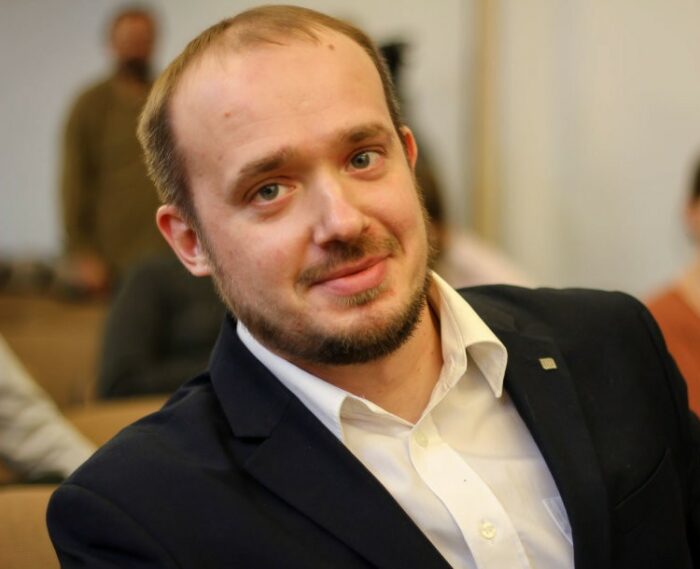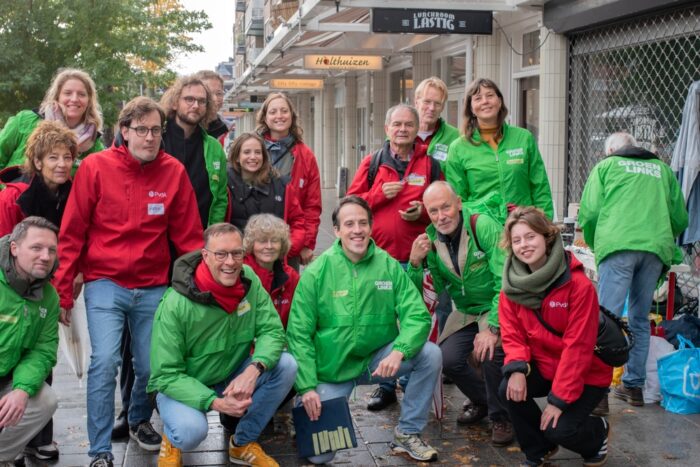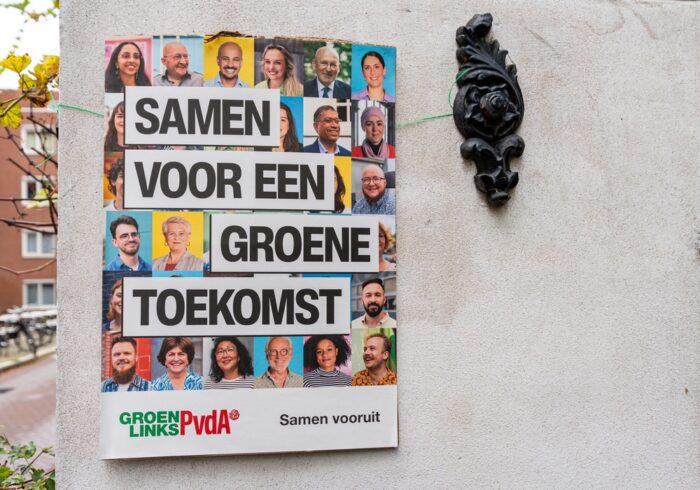Find all related Progressive Post
Progressive Post

The 2024 European elections were a hard test for Lithuania as one of the last EU countries without a strong eurosceptic voice. Ultimately, mainstream pro-European parties claimed the day receiving eight seats out of 11. However, the election of a notorious anti-gay populist, besides two MEPs going to the ECR, imply some notable changes.
One of the clearest trends since the first European elections in Lithuania is the increasing party fragmentation. While in 2004 and 2009, six lists had at least one seat each, in 2014 and 2019 there were already seven victorious forces, and in the last (fifth) election a total of eight parties sent their representatives to the European Parliament. Paradoxically, the number of Lithuanian MEPs themselves has been decreasing at the same time due to a decline of the general population – from 13 seats in 2004 to 11 in 2014, and onwards. With such an extreme level of party division, there is no surprise that the eurosceptic and anti-systemic voices had their fair chance to be heard and acknowledged by voters.
In total, 15 lists competed. Among them, seven parties have their political groups in the Lithuanian legislature (Seimas), which is an important advantage because of received state subsidies and wider representation in the public. Six of them indeed garnered at least one seat. The ruling Homeland Union – Lithuanian Christian Democrats (also usually called the Conservatives), belonging to the EPP, came top with three mandates and 21 per cent of the vote. They were followed by their chief mainstream rivals the Social Democrats (S&D) getting two seats and 18 per cent. Both parties in fact got the same number of MEP seats as in previous European Parliament elections in 2019.
The remaining parliamentary parties got one mandate each, garnering 5-9 per cent. Among parliamentary forces, they include two minor pro-market and socially liberal partners of the ruling coalition, the Freedom Party and Liberal Movement (both members of Renew). Within the opposition camp, the centrist-populist Farmers and Greens, and centre-left Democrats’ Union – For Lithuania, founded in 2022 after splitting from the Farmers and Greens, also received mandates. They both currently belong to the Greens in the European Parliament. The only parliamentary party that lost its representative was the centrist-populist Labour Party (Renew) whose founder tycoon MEP Viktor Uspaskich had to suddenly stand down due to an investigation into alleged misappropriation of European Parliament funds.
In general, the share of seats received by parties belonging to the mainstream European political groups, remained essentially the same as previously, with one important deviation. During the election campaign, the Farmers and Greens clearly indicated their intentions to join the ECR soon. Given that their leader, another tycoon, Ramūnas Karbauskis, has not shied away from certain eurosceptic ideas and projects since the start of his political career in the late 1990s, this decision may lead to the formation of a more formidable eurosceptic force in Lithuania than in the past. Moreover, the last two MEP seats were allocated to notable eurosceptics, the long-standing leader of the Polish Electoral Action MEP Waldemar Tomaszewski (ECR), and Petras Gražulis, an anti-gay populist and former MP impeached by the Seimas at the end of 2023.
Among extra-parliamentary parties that did not overcome the threshold, one may be singled out as a more disciplined and programmatic far-right National Alliance, eager to criticise the EU and its recently undertaken policies, such as the Green Deal. On the other hand, a small extra-parliamentary Green Party attempted to strike a progressive note by presenting an electoral list consisting only of women. The identity clash between the ‘traditionalist-nationalist’ and ‘green-libertarian’ camps was thus rather visible. Although the former side was much more numerous, the latter one (notably represented by the Freedom Party, and the Greens) was boosted by the LGBT Pride event held in Vilnius just one day before the actual vote. Nevertheless, the key topics featured in the political debates and election campaigns were other than that. Much attention was devoted to Russia’s ongoing full-scale invasion of Ukraine, and how Europe needs to answer to it. On the other hand, such bread-and-butter topics as the rise of living costs, and the need to enhance social rights at the EU level, were also widely circulating.
Despite abundant supply of both electoral lists and their diverse ideologies, the voter turnout was rather disappointing – just 29 per cent, which is the second worst result in the EU after Croatia. Also, it is a sharp drop from 2019, when 53.5 per cent of the voters participated. Such a steep decline was, however, hardly surprising given that the European Parliament vote was organised just two weeks after the presidential elections. In the past these two elections used to be organised together, and then the turnout hovered around 50 per cent. Low turnout primarily favoured the Conservatives whose electorate, albeit quite restricted, is more loyal than most of their rivals. Arguably, this is the key factor why they won the elections despite trailing behind the Social Democrats in national polls.
The European elections were also in the shadow of the parliamentary elections, which are to be held in October this year. For the Social Democrats, as well as for other parties, the European Parliament vote was essentially, therefore, an important albeit imperfect simulation before the ultimate battle in a few months. Although the Social Democrats remained with the same two seats, they can be cautiously optimistic. Their chief rivals on the left side, i.e. Farmers and Greens, and Democrats For Lithuania, performed much worse. It thus may send an important signal to the disgruntled voters about which opposition party is most capable of beating the incumbents. We will soon see if that is the case.
| Cookie | Duration | Description |
|---|---|---|
| cookielawinfo-checkbox-advertisement | 1 year | Set by the GDPR Cookie Consent plugin, this cookie is used to record the user consent for the cookies in the "Advertisement" category . |
| cookielawinfo-checkbox-analytics | 11 months | This cookie is set by GDPR Cookie Consent plugin. The cookie is used to store the user consent for the cookies in the category "Analytics". |
| cookielawinfo-checkbox-functional | 11 months | The cookie is set by GDPR cookie consent to record the user consent for the cookies in the category "Functional". |
| cookielawinfo-checkbox-necessary | 11 months | This cookie is set by GDPR Cookie Consent plugin. The cookies is used to store the user consent for the cookies in the category "Necessary". |
| cookielawinfo-checkbox-others | 11 months | This cookie is set by GDPR Cookie Consent plugin. The cookie is used to store the user consent for the cookies in the category "Other. |
| cookielawinfo-checkbox-performance | 11 months | This cookie is set by GDPR Cookie Consent plugin. The cookie is used to store the user consent for the cookies in the category "Performance". |
| csrftoken | past | This cookie is associated with Django web development platform for python. Used to help protect the website against Cross-Site Request Forgery attacks |
| JSESSIONID | session | The JSESSIONID cookie is used by New Relic to store a session identifier so that New Relic can monitor session counts for an application. |
| viewed_cookie_policy | 11 months | The cookie is set by the GDPR Cookie Consent plugin and is used to store whether or not user has consented to the use of cookies. It does not store any personal data. |
| Cookie | Duration | Description |
|---|---|---|
| __cf_bm | 30 minutes | This cookie, set by Cloudflare, is used to support Cloudflare Bot Management. |
| S | 1 hour | Used by Yahoo to provide ads, content or analytics. |
| sp_landing | 1 day | The sp_landing is set by Spotify to implement audio content from Spotify on the website and also registers information on user interaction related to the audio content. |
| sp_t | 1 year | The sp_t cookie is set by Spotify to implement audio content from Spotify on the website and also registers information on user interaction related to the audio content. |
| Cookie | Duration | Description |
|---|---|---|
| CONSENT | 2 years | YouTube sets this cookie via embedded youtube-videos and registers anonymous statistical data. |
| iutk | session | This cookie is used by Issuu analytic system to gather information regarding visitor activity on Issuu products. |
| s_vi | 2 years | An Adobe Analytics cookie that uses a unique visitor ID time/date stamp to identify a unique vistor to the website. |
| Cookie | Duration | Description |
|---|---|---|
| NID | 6 months | NID cookie, set by Google, is used for advertising purposes; to limit the number of times the user sees an ad, to mute unwanted ads, and to measure the effectiveness of ads. |
| VISITOR_INFO1_LIVE | 5 months 27 days | A cookie set by YouTube to measure bandwidth that determines whether the user gets the new or old player interface. |
| YSC | session | YSC cookie is set by Youtube and is used to track the views of embedded videos on Youtube pages. |
| yt-remote-connected-devices | never | YouTube sets this cookie to store the video preferences of the user using embedded YouTube video. |
| yt-remote-device-id | never | YouTube sets this cookie to store the video preferences of the user using embedded YouTube video. |
| yt.innertube::nextId | never | This cookie, set by YouTube, registers a unique ID to store data on what videos from YouTube the user has seen. |
| yt.innertube::requests | never | This cookie, set by YouTube, registers a unique ID to store data on what videos from YouTube the user has seen. |
| Cookie | Duration | Description |
|---|---|---|
| COMPASS | 1 hour | No description |
| ed3e2e5e5460c5b72cba896c22a5ff98 | session | No description available. |
| loglevel | never | No description available. |


